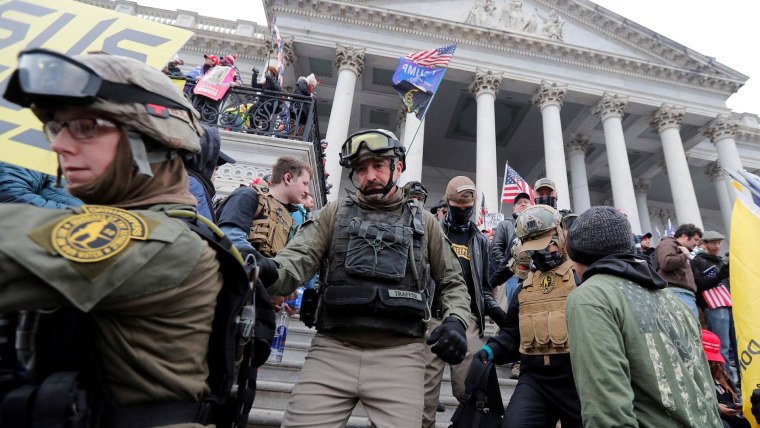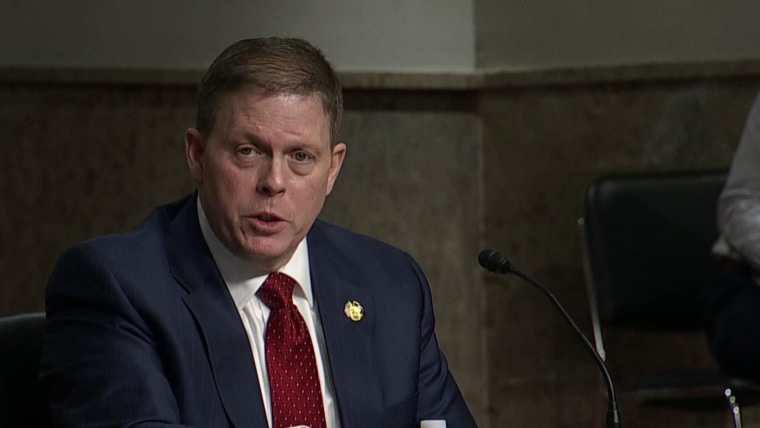WASHINGTON — Nearly two decades after the failure to share intelligence helped prevent the FBI from foiling the 9/11 attacks, the bureau is now accused of not making sure local police agencies fully appreciated the threats brewing among militia groups and white supremacists in the days before the assault on the United States Capitol.
An FBI intelligence report describing plans for violence at the Capitol was sent via email to lower-level officials the night before the Jan. 6 riot, and was never read by Capitol Police or Washington, D.C. leaders, according to testimony at Tuesday's Senate hearing.
Senators called that "an intelligence breakdown" by both the Capitol Police and the FBI.
"You can't just push send…and hope it gets to the right person," said Sen. Amy Klobuchar, the Minnesota Democrat who chairs the Committee on Rules and Administration.
The intelligence failure that left the Capitol and Washington, D.C. police forces unprepared for the mob that invaded the U.S. Capitol goes well beyond a single unread email from an FBI field office, current and former American officials and experts say. At issue, they say, is a hesitancy by the FBI and other agencies — born out of legitimate free speech concerns — to collect and disseminate intelligence based on the social media postings of domestic political actors.
"This should be a wake-up call for everyone that we have a major problem on our hands, because the intelligence was there," said Frank Figliuzzi, the former head of the FBI's counterintelligence division and a current NBC News analyst. "The whole system is broken in terms of what they can and can't look at."
For weeks leading up to Jan. 6, extremists said openly on social media that they planned to use violence to stop the Congressional certification of the presidential election, as NBC News and other organizations reported.
But the witnesses at Tuesday's hearing said they received no indication through formal intelligence channels — from the FBI and their own intelligence operations — that a storming of the Capitol was likely. Although a report from the FBI's Norfolk, Va., field office — the one sent by email the night before the riot — described social media threats of violence against the Capitol, top FBI officials never mentioned it or other threats in planning meetings, Acting Washington D.C. Police Chief Robert Contee said.
In a statement Tuesday evening, the FBI told NBC News that the Norfolk intelligence came from a message board thread and was “aspirational, with no specific and credible details.”
The FBI noted that it shared the information widely, posting it on a system known as the Law Enforcement Enterprise Portal (LEEP), which is available to law enforcement officers nationwide.
“The information supplied by Norfolk was discussed inside the Washington Office’s multi-agency Command Post, which was initiated on January 5” and included the Capitol Police, the statement said. “In accordance with our normal process, the FBI and our partners collected and shared available intelligence prior to the events of January 6.”
The statement did not respond to the criticism from lawmakers who said FBI officials should have personally briefed senior police officials on the intelligence.
Figliuzzi and other former FBI officials say FBI lawyers have long looked askance at intelligence reports based on the public utterances of domestic political actors, lest the bureau be accused of violating the Constitution's right to free speech. As NBC News has reported, the FBI and the Department of Homeland Security did not issue a joint intelligence bulletin in advance of the Jan. 6 Electoral College certification, though such bulletins are typically issued before major events. A bulletin wasn't issued in part over free speech concerns, officials said.
"Without the intelligence to properly prepare, (the Capitol Police) was significantly outnumbered and left to defend the Capitol against an extremely violent mob," former Capitol Police Chief Steven Sund testified.
That explanation didn't satisfy some lawmakers, however, who say no one needed an FBI intelligence analyst to tell them violence was a possibility on Jan. 6.
"In the days leading up to Jan. 6 I received a flood of texts from family and friends telling me to 'be safe' at the joint session," Rep. Eric Swallwell, a California Democrat who serves on the House Intelligence Committee, told NBC News. "They didn't have access to intelligence. But they did read the tweets from President Trump and his supporters. This was completely foreseeable."
Capitol Police and D.C. Police officials "look like they are incompetent when they say the intelligence wasn't there," Figliuzzi said. "It reminds us of 9/11. Here we are again. A failure to connect the dots."
Even in the context of the larger systemic issue, however, the handling of the intelligence report from the FBI's Norfolk field office was cited by senators as a notable failure.
The unvetted report, first disclosed by the Washington Post, cited social media posts by extremists preparing to travel to Washington to commit violence and "war," including one post that said, "Be ready to fight. Congress needs to hear glass breaking, doors being kicked in, and blood…being spilled."
Sund and Contee testified the report was emailed to the Capitol Police and the D.C. Police from the FBI's Joint Terrorism Task Force after business hours on Jan. 5, and the email never reached senior officials. They faulted the FBI for failing to make sure key players were informed.
"We're talking about a report that came from the Norfolk office that was sent to email boxes," Contee said. "As the chief of police for the Metropolitan Police Department, I assure you that my phone is on 24 hours a day, 7 days a week, and I'm available to get a phone call from any agency that has information with respect to something of this magnitude happening in our city."
Civil liberties groups have voiced opposition in recent days to granting law enforcement any new surveillance powers in the face of the domestic terrorism threat, because they say they fear those powers will be turned against marginalized communities.
The debate is just beginning, however.
As the hearing concluded, Sen. Gary Peters, the Michigan Democrat who chairs the Homeland Security Committee, said: "There's no question our federal government resources are not focused on effectively addressing the growing domestic threat."
"can" - Google News
February 24, 2021 at 04:31AM
https://ift.tt/3kt97bz
'You can't just push send': 20 years after 9/11, FBI accused of intel failure before Capitol riot - NBC News
"can" - Google News
https://ift.tt/2NE2i6G
https://ift.tt/3d3vX4n
Bagikan Berita Ini
















0 Response to "'You can't just push send': 20 years after 9/11, FBI accused of intel failure before Capitol riot - NBC News"
Post a Comment